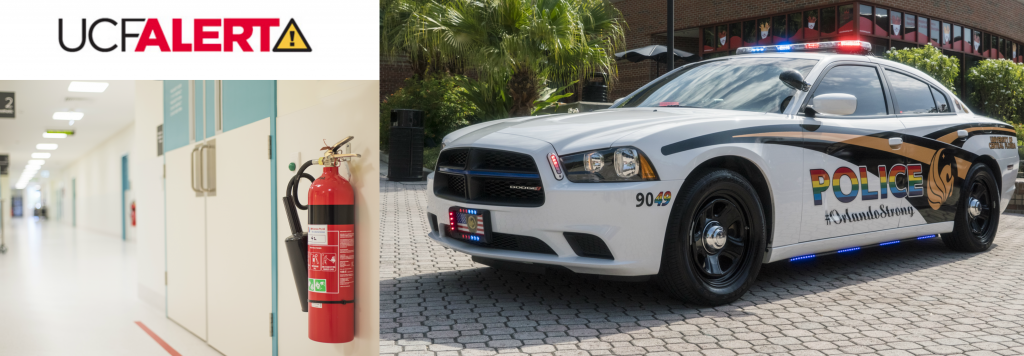Emergency Procedures and Evacuation Plans
Stay calm, know your plan, and get a head count.
In General:
- UCF Alert http://my.ucf.edu (Employee Self Service > Personal Information > UCF Alert)
- Text Messages: everyone is automatically added
- E-mail Messages: everyone is automatically added
- Ensure that you have an emergency contact identified
- Know your primary and secondary evacuation locations.
- Take responsibility for any students or guests that may be in your presence or in your classroom.
- Identify your building’s “area of refuge” location. Let your building liaison know if anyone in your area is permanently or temporarily disabled in such a way that they may need assistance.
Evacuation/Emergency Plan
Every unit/department should establish evacuation/emergency plans.
Anyone with mobility issues is to be guided to the nearest “area of refuge” location: This is normally a stairwell landing. They should stay against the far side of the landing and wait for help to arrive. This will allow for others to continue the evacuation. Safety Team designees need to be informed of anyone with mobility issues and to which stairwell they were directed. If anyone is unaccounted for, designee(s) should report that information to the authorities.

Fire: Evacuate
The Fire Prevention Specialist for UCF is Carl Jackson, Environmental Health and Safety (EH&S) –Carl.Jackson@ucf.edu – (407) 823-2314
A Fire Drill will be conducted annually, or as required, and will be coordinated between EH&S, the Building Liaison and Safety Teams, where present.
- Shut doors as you exit.
- Evacuate: Go to your nearest meeting location that is a minimum of 400 feet away from the building.
- A head count should be taken at the meeting location
- Fire Extinguisher Training is offered by EH&S for free to UCF employees.
Tornado/Severe Weather: Take Shelter
- Take shelter wherever you are.
- Keep all doors closed.
- Stay away from windows and exterior rooms of building, relocate to an interior room.
- If in a modular/portable building, relocate to a permanent facility
Hurricane/Tropical Storm: Campus Closing
Department of Security and Emergency Management Hurricane Information: http://emergency.ucf.edu/hurricanes.html
- Check the UCF Website (http://www.ucf.edu) and your phone/email for updates, campus closings will be announced.
- Campus closings will be specific to the affected areas – consider regional campus locations.
- If a hurricane watch is in effect, secure any sensitive records or technology.
Consider special preparations for research labs and equipment.
Bomb Threat/Suspicious Package: Respond and Evacuate if necessary
Department of Security and Emergency Management Bomb Plan and Checklist: http://www.emergency.ucf.edu/plans.html
Assess the threat via the UCF Bomb Threat Checklist (keep where accessible or by your phone).
- Do not pull any emergency alarm; turn off and do not use a cell phone (an explosive device may be triggered based on cell signal).
- Any threat should be taken seriously and reported
- Evacuate if instructed by the Building Liaison or authorities.
- Leave doors open as you exit.
Hostile/Armed Intruder: Escape or Take Shelter
Safety & Security, Hostile/Armed Intruder contact: Joseph Thalheimer 407-882-7111
- Silence your cell phone (mute, not vibrate).
- Do not pull any emergency alarm.
- Go to locations that are to be safe rooms (locking door or doors).
- Lock all external doors, (if possible) shut blinds, silence cell phones, and (if possible) call for assistance.
To hold an active-shooter drill, first notify Jennifer Steele, Jennifer.Steele@ucf.edu (associate director, COS facilities). This effort will need to be coordinated between the building coordinator(s) as every unit within the building will participate, Emergency Management and the UCF Police Department.
Watch the UCF Police Department’s video about what to do in an active shooter situation below.
Other Emergency Information
- UCF Emergency Management Information: http://www.emergency.ucf.edu/emergency_guide.html
- General info: Joseph Thalheimmer , Director of Emergency Management: joseph.thalheimer@ucf.edu 407-882-7111
- UCF Policy 3-100.1 Building Evacuation: 3-100-1building-evacuation
- UCF Policy 3-119.1 Weapons on university Property and at University Events: http://policies.ucf.edu/documents/3-119.1WeaponsOnUniversityPropertyAndAtUniversityEvents.pdf